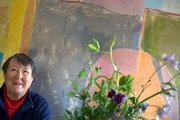Norwegian Supreme Court rules against wind project
October 11th, 2021

Statkraft may have put wind in, but the Norwegian Supreme Court says otherwise.
Here’s the Court’s press release.
From that press release, it seems that cumulative impacts was the factor that tipped the scales:

And the decision about the Fosen Vind project, IN NORWEGIAN — the court has said it will be translated in its entirety someday:
Duluth Tomorrow – Solveig Arneng Johnson documentary
February 10th, 2012

Tomorrow, a documentary about Sami artist Solveig Arneng Johnson, will be shown in Duluth:
Solveig: The Life and Artwork of Solveig Arneng Johnson
4 p.m. Feb. 11
Zinema 2
222 East Superior St.
Duluth, MN
A bio on her – Johnson’s Works as Fresh as Arctic Ice
From the Duluth News Tribune:
“I came to Duluth and soon realized that a career in art was not possible in Duluth at that time,” Solveig Johnson said. “I decided to paint not for fame and fortune, but for my family and for myself.”
The 39-minute film is Johnson’s life story told in her own voice and through her oil paintings: It tells of her growing up in Kirkenes, Norway, during World War II, gaining recognition for her artwork at a prestigious art school in Oslo, meeting the love of her life and moving with him to Minnesota, the life they built together and her identity as a Sami, the indigenous people of Europe.
Johnson’s art serves as a photo album in the film. There are portraits: her son, Kai, with his classic baby face and rosy cheeks; her father and the red mustache he twisted; her husband fresh from the garden caught in a moment where she stopped him and asked him to pose, and her daughter, pregnant, wearing a sundress and flip-flops.
There also are captured moments: a fox she and her husband encountered on a walk in the woods or the view from an airplane window, different shades of green and brown, a reminder of the time she was flying over Minnesota with her mother and said, “This is my country.”
There are more-abstract pieces: She painted a large-scale piece using Sami colors and images that includes two stick figures as a 25th anniversary gift to her husband.
Chace met Johnson through connections made while working on the documentary, “I’m Not Black, I’m Coloured: Identity Crises at the Cape of Good Hope.” Chace had spent some time in the Sami region of Norway and was told there was a large population of Sami people living in Duluth.
“There was just something about her spirit that I loved,” Chace said of Johnson, a Sami elder. “This one I was led to spiritually; not in a religious way, I just felt a connection.”
Chace intended to make a 15- to 20-minute biography, but when she found out about the artwork the project grew.
“I tried to let the art speak for itself,” Chace said. “I wanted her spirit to show and her artwork to lead the film. The challenge is to take someone no one knows about and make a beautiful story. It’s brought me a lot of joy.”
Chace will show the work at festivals and said she has gotten interest from cultural centers around the country.
Some of Johnson’s work hangs in her home near Chester Creek, and some has been given to friends and family. There are two pieces in the Vesterheim Norwegian-American Museum in Decorah, Iowa. She’s had pieces shown at the Duluth Art Institute and the Tweed Museum of Art at the University of Minnesota Duluth.
Johnson, who has macular degeneration, is legally blind and stopped painting about a decade ago.
“The colors aren’t the same,” Johnson said. “It’s discouraging to paint. As my daughter says, ‘I’m on vacation.’ ”